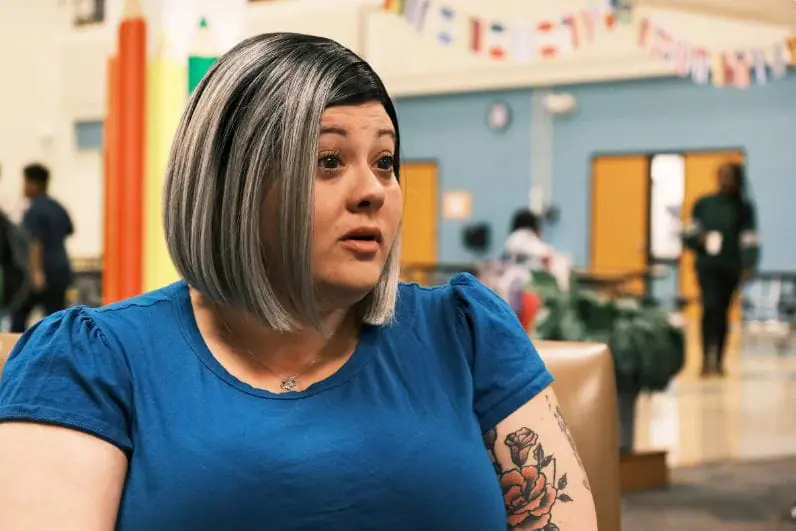IPS school hosts blood drive for mom with rare disease
(MIRROR INDY) — For Kori Durham, the Edison School of the Arts is a family away from home.
Her three children are all enrolled at the arts-centered school, and she’s a member of the school’s parent leadership team. For years, she devoted much of her day to volunteering in classrooms at the school and, in the evenings, she helped plan different school events with staff and parents.
“I love the kids here, I love the parents,” Durham said. “It’s a positive place to be.”
But now, it’s the 39-year-old Durham who needs the helping hand. Her fellow parents and Edison school leadership have banded together to help Durham, who has a rare disease that requires frequent blood transfusions. The school, with help from Versiti Blood Center of Indiana, will hold a blood drive for Durham and other Hoosiers like her on May 1.
You see, lately Durham has had to cut down on her involvement at the school. It’s not because she cares any less than she did before. It’s because her body won’t let her do more.
Durham has myasthenia gravis, a rare neurological autoimmune disease that changes how nerves communicate with muscles, weakening them throughout the day. Only about 60,000 people in the U.S. have it.
“It’s like a constant war between your body and your mind,” Durham said. “You want to be able to do these things and your body says no. At the end of the day, I am depleted, I am exhausted. It’s a level of fatigue that’s hard to explain.”
There is no cure for the disease, but several medications exist to treat it. Unfortunately, Durham’s body has rejected them all.
The only treatment available to her is called intravenous immunoglobulin, or IVIg, a medication made from the pooled antibodies of blood donors that are infused into her body to replace her own antibodies, which are attacking her body.
The medication requires the blood plasma from thousands of donors.
“Each one of my infusions ends up needing approximately 10,000 donors to get what I need out of that plasma for my IVIg,” Durham said. “I’m at the point now where I am receiving that infusion every single week. And I probably will need to for the rest of my life.”
It’s a difficult proposition for Durham. Her life depends on the kindness of others — a kindness that’s not always there.
According to the Versiti Blood Centers of Indiana, 500 units of blood a day are required to meet the average demand in Indianapolis. The actual amount of blood available fluctuates depending on the time of year and how much is needed.
“We see drastic drops in donations in the spring and summer months,” said Denena Edwards, director of donor services at Versiti. “Twenty five percent of blood donations come from high schools and college partners. When school’s not in session, we often experience critical shortages.”
When there’s not enough blood to go around, Durham has to be hospitalized, often for days at a time.
Edison parents are glad to help
Leea Fetz, 28, is a mother of three Edison students. After Fetz enrolled her kids in the school two years ago, Durham reached out to her and offered to help ease the transition to ensure her kids could fit in.
“It’s kind of scary going into that new environment without knowing any parents or teachers or anything,” Fetz said. “She’s just so welcoming and warm. She just makes you feel like you’re wanted there.”
When it came time to return the favor, Fetz said she thought long and hard about the best way to help Durham. She came up with the idea to hold the blood drive.
“Everybody is always asking her, ‘What can I do to help? Can I bring you dinner?’” Fetz said. “And I just figured her freezer is so overrun with casseroles at this point, there has to be more effective help.”
Durham doesn’t like being the center of attention, but she is grateful for all the support she is receiving from her Edison family.
“At the end of the day, it’s so much less about me and so much more about the person who was just in the car accident who needs a blood transfusion or had a complication during a surgery,” Durham said.
Edwards said the most needed blood types are type O negative, the blood type most commonly used in transfusions, and type O positive, the most common blood type.
Sign up for the blood drive
The blood drive will be 3 to 7:15 p.m. May 1 at Edison School of the Arts at 777 S. White River Parkway W. Drive.
You can register to donate here. Walk-ins are also welcome.
Mirror Indy reporter Enrique Saenz covers west Indianapolis. Contact him at 317-983-4203 or enrique.saenz@mirrorindy.org. Follow him on X @heyEnriqueSaenz
